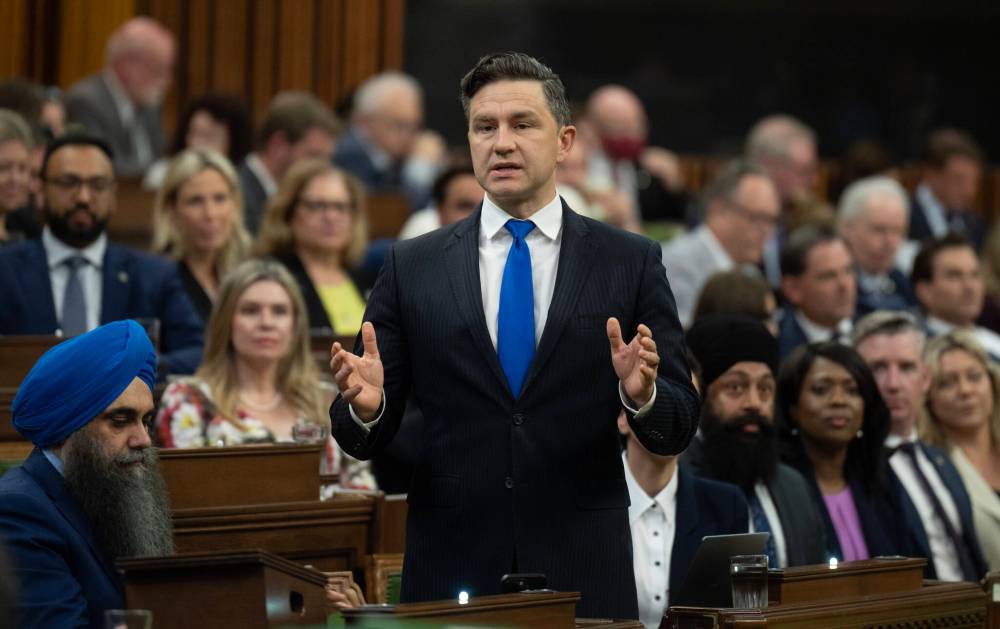Calling for an election that’s not happening yet
Advertisement
Read this article for free:
or
Already have an account? Log in here »
To continue reading, please subscribe:
Monthly Digital Subscription
$0 for the first 4 weeks*
- Enjoy unlimited reading on winnipegfreepress.com
- Read the E-Edition, our digital replica newspaper
- Access News Break, our award-winning app
- Play interactive puzzles
*No charge for 4 weeks then price increases to the regular rate of $19.00 plus GST every four weeks. Offer available to new and qualified returning subscribers only. Cancel any time.
Monthly Digital Subscription
$4.75/week*
- Enjoy unlimited reading on winnipegfreepress.com
- Read the E-Edition, our digital replica newspaper
- Access News Break, our award-winning app
- Play interactive puzzles
*Billed as $19 plus GST every four weeks. Cancel any time.
To continue reading, please subscribe:
Add Free Press access to your Brandon Sun subscription for only an additional
$1 for the first 4 weeks*
*Your next subscription payment will increase by $1.00 and you will be charged $16.99 plus GST for four weeks. After four weeks, your payment will increase to $23.99 plus GST every four weeks.
Read unlimited articles for free today:
or
Already have an account? Log in here »
Hey there, time traveller!
This article was published 06/09/2024 (441 days ago), so information in it may no longer be current.
Under the heading of not-exactly-a-newsflash, this just in: Pierre Poilievre would like Canadians to go to the polls this fall, rather than next, for a federal election.
The Conservative party leader last week called on the heads of other opposition parties to force an early vote, and even wrote a letter to NDP Leader Jagmeet Singh demanding that he pull out of the supply and confidence agreement that had allowed the minority Liberal government to continue functioning since 2022.
The deal, which Singh declared dead on Wednesday, committed the NDP to keeping Prime Minister Justin Trudeau’s party in power until next year, with continuing New Democrat support contingent on the Liberals’ agreement to move on key NDP priorities such as dental care and pharmacare.

Adrian Wyld / The Canadian Press files
Conservative Leader Pierre Poilievre
Trudeau’s decision to force binding arbitration to end contract disputes at the nation’s railways was a “line in the sand that was crossed,” according to Singh, who said the NDP decision had nothing to do with Poilievre’s letter or demand.
Poilievre — whose party is currently polling nearly 20 percentage points ahead of the Trudeau-led Liberals — called Singh’s pull-out from the deal a “media stunt” because the NDP leader did not immediately “state whether the NDP will vote with non-confidence to cause a carbon tax election at the first chance.”
Based on current polling numbers, an election this autumn would almost surely install Poilievre as prime minister. But given the quagmire-deep level of unpopularity the current PM has descended to, it seems highly unlikely Trudeau’s fate would be any different if the election takes place next year, as scheduled.
Contrary to the Opposition leader’s assertion last week that Canadians “cannot afford another painful, costly, chaotic and corrupt year of Justin Trudeau,” there’s little to suggest the current government’s actions are either corrupt or unnecessarily chaotic. Unpopular, yes, but one could fairly argue that’s more a function of its leader having worn out his welcome than its policies genuinely having run afoul of most Canadians’ sensibilities.
There’s a measure of truth to the “costly” and “painful” portion of Poilievre’s doomsaying declaration, but Canadians have endured the same post-pandemic cost-of-living pinch as folks elsewhere. Global inflation is not “Justinflation,” despite Poilievre’s continuing use of the agitational epithet.
In arguing for an end to the supply and confidence agreement, Poilievre referred to the NDP leader as “Sellout Singh,” suggesting the reason he was allowing Trudeau to remain in power was that in 2025, Singh would qualify for a parliamentary pension.
That’s a rich assertion, both figuratively and literally, coming from a career politician who has been on the parliamentary payroll since age 25 and who became eligible in 2010 for the same pension he derisively accused Singh of pursuing.
But that, lamentably, is how the man who would be prime minister rolls. Borrowing a page (chapters, perhaps) from the playbook of our southern neighbours’ Republican presidential nominee, Poilievre has adopted a post-truth approach to politicking in which falsehoods are fruitful because, as Donald Trump has explained, if you say them often enough people will believe them.
Poilievre is highly educated, seems to understand the realities of politics and the real world and, as such, must necessarily be aware the inflammatory things he says are untrue. He chooses cynicism because, for him, in the current polarized climate, it works.
Whether the federal election occurs this fall, as he desires, or next fall, as is mandated, the man who aspires to be our next prime minister owes Canadians something more than the systematic sowing of falsehood-fuelled despair. Simply put, it’s time for the PM in waiting to start acting a bit more prime ministerial.





